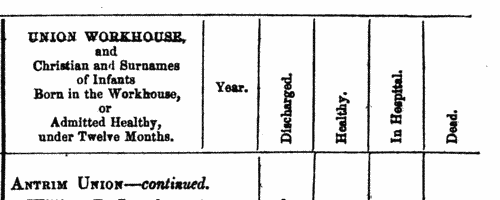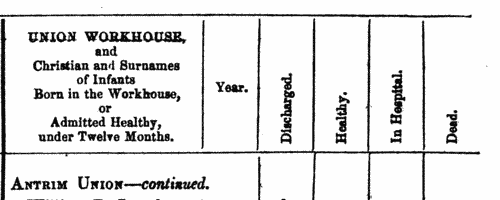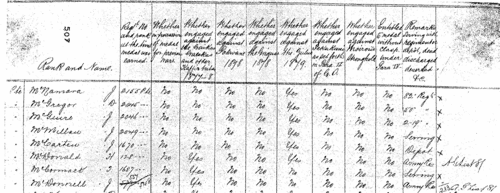Gately Surname Ancestry ResultsOur indexes 1000-1999 include entries for the spelling 'gately'. In the period you have requested, we have the following 38 records (displaying 21 to 30): Single Surname Subscription | | | Buying all 38 results of this search individually would cost £248.00. But you can have free access to all 38 records for a year, to view, to save and print, for £100. Save £148.00. More... |
These sample scans are from the original record. You will get scans of the full pages or articles where the surname you searched for has been found. Your web browser may prevent the sample windows from opening; in this case please change your browser settings to allow pop-up windows from this site. Irish Bankrupts
(1840)
Bankruptcy notices for Ireland: bankruptcy often caused people to restart their lives elsewhere, so these are an important source for lost linksGATELY. Cost: £6.00.  | Sample scan, click to enlarge

| Insolvents
(1842)
Insolvency notices for England and Wales: insolvency often caused people to restart their lives elsewhere, so these are an important source for lost linksGATELY. Cost: £6.00.  | Sample scan, click to enlarge

|  British infantry fighting in China
(1856-1860) British infantry fighting in China
(1856-1860)
The China Medal was awarded to soldiers and sailors who took part in the prosecution of the war against the Chinese from 1856 to 1860. Separate clasps were awarded for men who had been in receipt of the China Medal of 1842; for being actually present at Canton on 28 and 29 December 1857, when that city was bombarded and finally captured; for being actually engaged in the operations which ceased with the first capture of the Taku Forts, 20 May 1858, and led to the Treaty of Tientsin; for being actually present at the capture of the Taku Forts 21 August 1860; and for being actually present before Pekin the day the gate of that city was given up to the allied (British and French) army, viz. on 13 October 1860. The 67th (The South Hampshire) Regiment of Foot, based at Athlone, embarked for India 18 September 1858, and was transferred to China in 1859, taking part in the capture of the Taku Forts and Pekin, and the operations against the Taiping rebels in 1862 to 1863: the right wing was moved to Japan in 1864 for the occupation of Yokohama. The regiment returned to the Cape of Good Hope in 1865, and back to Ireland in 1866.GATELY. Cost: £8.00.  | Sample scan, click to enlarge

|  British infantry fighting in China
(1860) British infantry fighting in China
(1860)
The China Medal was awarded to soldiers and sailors who took part in the prosecution of the war against the Chinese from 1856 to 1860. Separate clasps were awarded for men who had been in receipt of the China Medal of 1842; for being actually present at Canton on 28 and 29 December 1857, when that city was bombarded and finally captured; for being actually engaged in the operations which ceased with the first capture of the Taku Forts, 20 May 1858, and led to the Treaty of Tientsin; for being actually present at the capture of the Taku Forts 21 August 1860; and for being actually present before Pekin the day the gate of that city was given up to the allied (British and French) army, viz. on 13 October 1860. The 1st battalion, the 3rd (East Kent) Regiment of Foot (the Buffs), based in Limerick, embarked for Malta 2 April 1851. The battalion took part on in the capture of the Taku Forts.GATELY. Cost: £8.00.  | Sample scan, click to enlarge

| Long-stay Paupers in Workhouses: Droitwich
(1861)
This comprehensive return by the Poor Law Board for England and Wales in July 1861 revealed that of the 67,800 paupers aged 16 or over, exclusive of vagrants, then in the Board's workhouses, 14,216 (6,569 men, 7,647 women) had been inmates for a continuous period of five years and upwards. The return lists all these long-stay inmates from each of the 626 workhouses that had been existence for five years and more, giving full name; the amount of time that each had been in the workhouse (years and months); the reason assigned why the pauper in each case was unable to sustain himself or herself; and whether or not the pauper had been brought up in a district or workhouse school (very few had). The commonest reasons given for this long stay in the workhouse were: old age and infirm (3,331); infirm (2,565); idiot (1,565); weak mind (1,026); imbecile (997); and illness (493). GATELY. Cost: £6.00.  | Sample scan, click to enlarge

| Infants in Kilrush Workhouse, County Clare
(1872)
Return, “with Christian and Surname of each, of Infants Born in Irish Workhouses, or Admitted thereto when Healthy under Twelve Months Old, and attempted to be Reared therein during the Years 1872 to 1874, showing what has since become of them”. The returns from each poor law union workhouse give: Christian and Surname of Infant Born in the Workhouse, or Admitted Healthy, under Twelve Months; Year; and whether discharged, healthy, in hospital, or dead. GATELY. Cost: £6.00.  | Sample scan, click to enlarge

| Infants in Athlone Workhouse: Roscommon and Westmeath
(1873)
Return, “with Christian and Surname of each, of Infants Born in Irish Workhouses, or Admitted thereto when Healthy under Twelve Months Old, and attempted to be Reared therein during the Years 1872 to 1874, showing what has since become of them”. The returns from each poor law union workhouse give: Christian and Surname of Infant Born in the Workhouse, or Admitted Healthy, under Twelve Months; Year; and whether discharged, healthy, in hospital, or dead. GATELY. Cost: £6.00.  | Sample scan, click to enlarge

| Freeholders in county Roscommon
(1873-1875)
Owners of an acre or more, whether resident there or elsewhere: with their addresses; the acreage; and a valuation of the land. The survey commenced in February 1873, the last returns being received in November 1875.GATELY. Cost: £4.00.  | Sample scan, click to enlarge

|  Men of the 3rd Regiment of Foot (East Kent - the Buffs) fighting in South Africa
(1877-1879) Men of the 3rd Regiment of Foot (East Kent - the Buffs) fighting in South Africa
(1877-1879)
What is commonly called the Zulu War Medal was awarded to those British soldiers who fought in a series of conflicts in southern Africa from 1877 (the Kaffir War) through to 1879 (the Zulu War). In 1880 the various units submitted returns of the officers, non-commissioned officers and men 'entitled to the Medal for Military Operations in South Africa during 1877-8-9' and these 'medal rolls' are now in the National Archives. The returns are made with the information arranged in twelve columns:
1. Rank and name
2. Regimental number and rank at the time the medal was earned
3. Whether in possession of medal for previous wars
4. Whether engaged against the Gaikas, Galekas and other Kaffir tribes 1877-8
5. Whether engaged against Pokwane 1878
6. Whether engaged against the Griquas 1878
7. Whether engaged against the Zulus 1879
8. Whether engaged against Sekukuni as set forth in Par. 2. G. O.
9. Whether engaged against Moirosi's stronghold
10. Entitled to medal without clasp under Par. 4.
11. Serving with regiment, depot, dead, discharged, deserted, &c.
12. Notes and cross-references to the Adjutant-General's medal lists.
WO 100/46.
GATELY. Cost: £8.00.  | Sample scan, click to enlarge

| Debtors
(1880)
Bills of sale (binding assets to a creditor/lender) in England and Wales, October to December 1880GATELY. Cost: £6.00.  | Sample scan, click to enlarge

|
Research your ancestry, family history, genealogy and one-name study by direct access to original records and archives indexed by surname.
|













